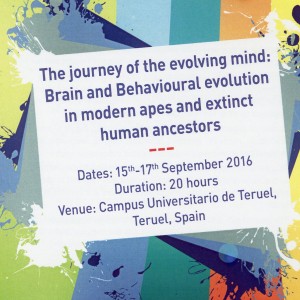M. J. Walker ponente en la Universidad de Verano de Teruel
 Los días 15 a 147 de septiembre de 2016 va a tener lugar en la Universidad de Verano de Teruel el curso sobre cerebro y evolución titulado: “The journey of the evolving mind: Brain and Behavioural evolution in modern apes and extinct human ancestors”.
Los días 15 a 147 de septiembre de 2016 va a tener lugar en la Universidad de Verano de Teruel el curso sobre cerebro y evolución titulado: “The journey of the evolving mind: Brain and Behavioural evolution in modern apes and extinct human ancestors”.
Dirigido por D. Héctor Marín Manrique, profesor de la Universidad de Zaragoza y con el presidente de MUPANTQUAT, D. Michael J. Walker como uno de los ponentes principales.
El curso tiene como objetivo proporcionar una visión general del complejo comportamiento de los humanos modernos, y considerar en qué se diferencia del de los primates no humanos y nuestros antepasados homínidos. También describir y analizar cómo los seres humanos modernos resuelven los problemas físicos y sociales, y el grado en el que las estrategias comparables son empleadas por otros primates que se enfrentan a problemas análogos.
Otro objetivo es discutir los aspectos de la flexibilidad cognitiva, la planificación, la teoría de la mente ,la memoria de procedimientos, actividades simbólicas, la cultura, el lenguaje y la evolución cerebral. Igualmente, tener en cuenta las tecnologías humanos y primates en contexto evolutivo, con especial referencia a las capacidades cognitivas necesarias para usar o producir herramientas y los circuitos neuronales subyacentes y sistemas en el cerebro.
El objetivo general consiste en presentar a los participantes los aspectos significativos de los caminos evolutivos que han llevado a los cerebros y el comportamiento de los grandes simios y los seres humanos complejos.
Programa:
Thursday, September 15th
8:45-9:00 h Arrival and registration.
9:00-11:00 h Stone tools and the origins and evolution of early human technology: affordances, constraints, memory. Michael Walker.
11:00-11:30 h Coffee break.
11:30-13:30 h Tool use and tool manufacture in non-human Primates. Héctor M. Manrique.
13:30-16:00 h Lunch break.
16:00-18:00 h Prospective thinking, action planning and Theory of Mind (ToM) in apes. Héctor M. Manrique.
18:00-18:30 h Coffee break.
18:30-20:30 h Observational learning and evolution of the human brain; aspects of neurophysiology and neuroanatomy; mirror-neurone circuitry and shared attention; the relation between working memory and long-term procedural memory; prospective memory and multitasking. Michael Walker.
Friday, September 16th
9:00-11:00 h Why do not great apes assemble tools? Aspects of cognitive versatility; prefrontal cortical monitoring of behaviour; parietal cortical appreciation of manipulating tools. Michael Walker and Héctor M. Manrique.
11:00-11:30 h Coffee break.
11:30-13:30 h Primate archaeology: the origins of technology or what tools tell us about their makers. Susana Carvalho.
13:30-16:00 h Lunch break.
16:00-18:00 h Non-human Primates as models for behavioural evolution (technology, hunting, warfare, etc.). Susana Carvalho.
18:00-18:30 h Coffee break.
18:30-20:30 h How environment shapes the body and the cognition in extant Primates. René Bobe.
Saturday, September 17th
9:00-11:00 h On wishful thinking: Did Palaeolithic humans customarily engage in symbolic behaviour before 40,000 years ago? Michael Walker.
11:00-11:30 h The ecology of early Australopithecus. René Bobe.
Ponentes:
Prof. Dr. Héctor Marín Manrique. Departamento de Psicología. Universidad de Zaragoza.
Prof. Dr. Michael Walker. Emeritus Professor of Physical Anthropology. Department of Zoology & Physical Anthropology. University of Murcia.
Prof. Dr. René Bobe. Associate Professor at University of Chile. Associate Research Professor at George Washington University, USA. Research Associate at Institute of Cognitive and Evolutionary Anthropology.University of Oxford. UK.
Prof. Dr. Susana Carvalho. Associate Professor at Institute of Cognitive and Evolutionary Anthropology. University of Oxford. UK. Associate Director of Paleontology and Primatology. Gorongosa National Park, Mozambique. Visiting Assistant Professor. Universidade de Coimbra, Portugal.




